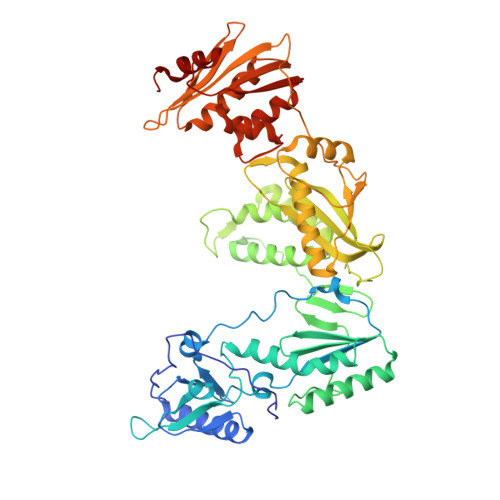Design and synthesis of conformationally constrained inhibitors of non-nucleoside reverse transcriptase.
Gomez, R., Jolly, S.J., Williams, T., Vacca, J.P., Torrent, M., McGaughey, G., Lai, M.T., Felock, P., Munshi, V., Distefano, D., Flynn, J., Miller, M., Yan, Y., Reid, J., Sanchez, R., Liang, Y., Paton, B., Wan, B.L., Anthony, N.(2011) J Med Chem 54: 7920-7933
- PubMed: 21985673
- DOI: https://doi.org/10.1021/jm2010173
- Primary Citation of Related Structures:
3T19, 3T1A - PubMed Abstract:
Highly active antiretroviral therapy (HAART) significantly reduces human immunodeficiency virus (HIV) viral load and has led to a dramatic decrease in acquired immunodeficiency syndrome (AIDS) related mortality. Despite this success, there remains a critical need for new HIV therapies to address the emergence of drug resistant viral strains. Next generation NNRTIs are sought that are effective against these mutant forms of the HIV virus. The bound conformations of our lead inhibitors, MK-1107 (1) and MK-4965 (2), were divergent about the oxymethylene linker, and each of these conformations was rigidified using two isomeric cyclic constraints. The constraint derived from the bioactive conformation of 2provided novel, highly potent NNRTIs that possess broad spectrum antiviral activity and good pharmacokinetic profiles. Systematic SAR led to the identification of indazole as the optimal conformational constraint to provide MK-6186 (3) and MK-7445 (6). Despite their reduced flexibility, these compounds had potency comparable to that of the corresponding acyclic ethers in both recombinant enzyme and cell based assays against both the wild-type and the clinically relevant mutant strains.
Organizational Affiliation:
Departments of West Point Discovery Chemistry, Pennsylvania 19486-0004, United States. Robert_gomez@merck.com















